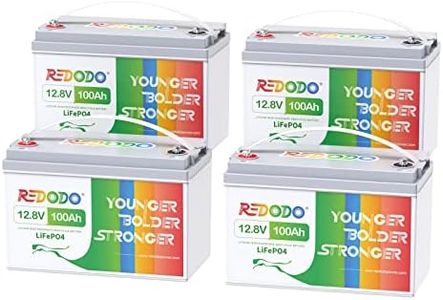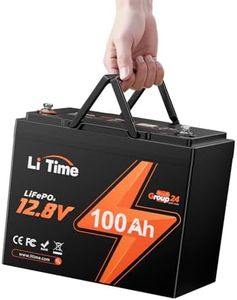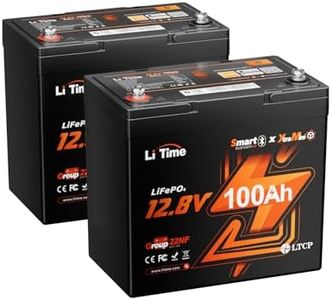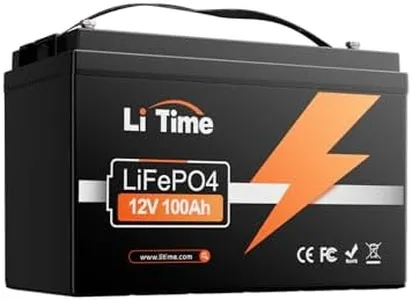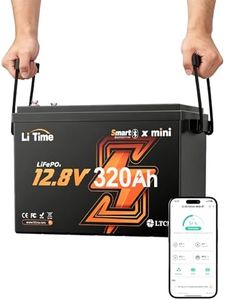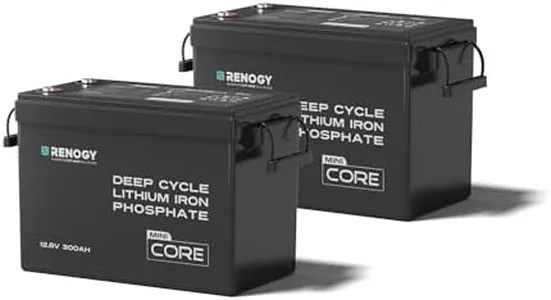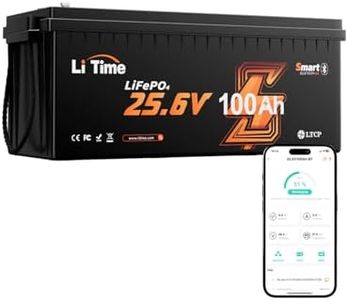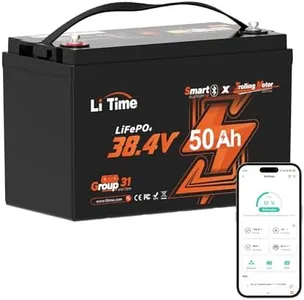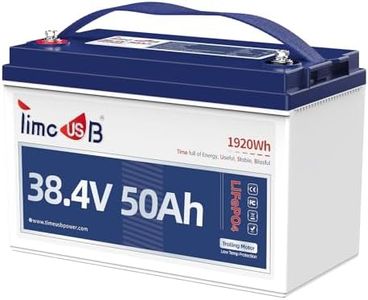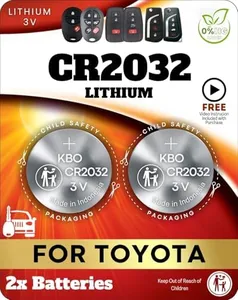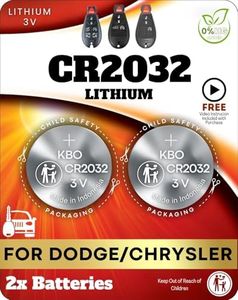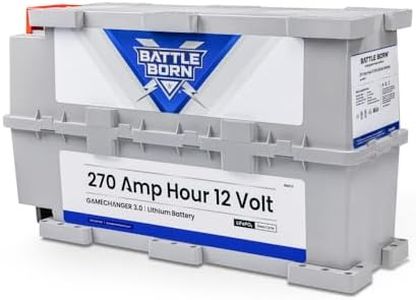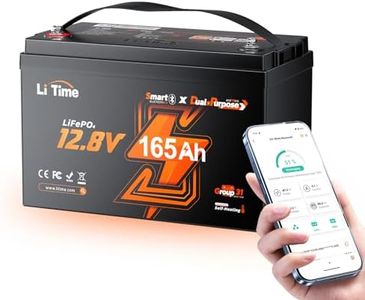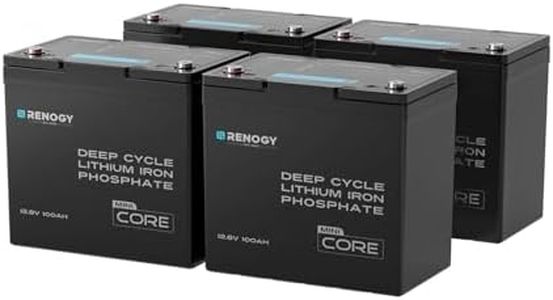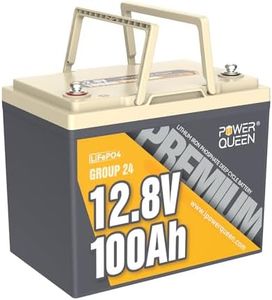10 Best Lithium Battery For Kayak 2026 in the United States
Our technology thoroughly searches through the online shopping world, reviewing hundreds of sites. We then process and analyze this information, updating in real-time to bring you the latest top-rated products. This way, you always get the best and most current options available.

Our Top Picks
Winner
LiTime 12V 100Ah RV Lithium Battery,Group 24 Rechargeable LiFePO4 Battery with Up to 15000 Cycles, 1.28kWh and Higher Energy Density, Perfect for Trolling Motors, Boat, Marine, Solar etc.
Most important from
2592 reviews
The LiTime 12V 100Ah lithium battery is a solid choice if you need a reliable and lightweight power source for your kayak, especially if you use trolling motors or small marine electronics. Its 100Ah capacity and 12V voltage provide plenty of power, and the battery weighs only 21 pounds, which is about one-third lighter than traditional AGM batteries of similar size. This makes it easier to handle and transport on a kayak.
It has a compact Group 24 size that fits commonly in marine and RV setups, helping save space. One of the strongest points is its long lifespan—over 4,000 full charge cycles and up to 10 years of use—meaning you won’t need to replace it often. Its built-in battery management system protects it from overcharging and discharging, ensuring safe and stable operation. The battery also offers expandability if you want to connect multiple units for more power, which is useful in larger off-grid setups.
This battery is powerful, efficient, and durable, making it a great option for kayak users who prioritize lightweight and long-lasting power, but you should consider waterproof measures when using it directly on watercraft.
Most important from
2592 reviews
LiTime 12V 100Ah Xtra-Mini Bluetooth Trolling Motor LiFePO4 Battery, 12 Volt MINI Small Lithium Batteries, Up to 15000 Deep Cycle, 100A BMS for RV, Camper, Travel Trailers, Boat, Yacht, Kayak (2-Pack)
Most important from
475 reviews
The LiTime 12V 100Ah Xtra-Mini LiFePO4 battery is a compact and lightweight lithium battery well suited for kayakers who need reliable, high-capacity power without bulky equipment. Offering 100 amp-hours at 12 volts, it delivers ample energy (around 1280Wh) to run trolling motors or other small devices on the water. Its small size (about 9 x 5.5 x 8 inches) and relatively light weight (about 19 pounds per battery) make it easy to carry and fit in tight spaces typical on kayaks or small boats.
With a strong cycle life of over 4000 deep charges and a lifespan exceeding 10 years, this battery can be a long-term investment for frequent paddlers. It also supports fast charging—recharging fully in about an hour—which is convenient for day trips or multi-day adventures. The built-in Bluetooth lets you monitor battery status in real time through an app, helping prevent surprises while out on the water. The battery includes more than 20 safety protections, such as temperature cut-offs and moisture resistance, making it durable and well-prepared for outdoor, wet environments typically encountered while kayaking. It is important to note this battery is not designed for starting engines or golf carts, so it’s best suited for powering trolling motors and electronics rather than heavy starting loads.
One drawback is the weight: while lighter than many lead-acid alternatives, 19 pounds per battery still requires some effort to transport if carrying multiple units. Also, the need to buy two batteries for some setups increases the overall cost and transport complexity. Shipping might arrive in multiple packages, which could be inconvenient. This LiTime battery is a smart choice for kayakers seeking a compact, durable, and powerful lithium battery that supports long usage cycles and quick recharge, fitting well within the demands of paddle sports and small boating.
Most important from
475 reviews
LiTime 12V 100Ah RV Lithium Battery, Group 31 Rechargeable LiFePO4 Battery with Up to 15000 Deep Cycles, 1.28kWh and Higher Energy Density, Perfect for Van, Trolling Motors, Boat, Marine. (1 Pack)
Most important from
2592 reviews
The LiTime 12V 100Ah LiFePO4 battery is a strong choice if you need a lightweight, reliable lithium battery for a kayak or similar outdoor use. It offers a full 12V and a solid 100Ah capacity, enough to power trolling motors or other gear for extended periods. Weighing about 24 pounds, it’s much lighter than traditional lead-acid batteries, which makes it easier to handle and transport during trips. The battery is built with high-quality LiFePO4 cells that provide stable performance and good safety, backed by UL certification and a built-in 100A battery management system to protect against overcharge or discharge. Its size (roughly 13 by 6.8 by 8.4 inches) should fit well in most kayak battery compartments, but it’s always good to check space first.
One of the biggest advantages is its long cycle life—between 4,000 to 15,000 charge cycles depending on how deeply you discharge it—meaning it can last many years, far beyond typical lead-acid batteries. This also means it holds charge well and delivers consistent power (up to 95% efficiency) without the memory effect, so you can charge and use it anytime without worry. It’s designed mainly for energy storage and not for engine starting, so it’s best suited for running electronics or trolling motors rather than ignition.
Backed by a 5-year warranty and responsive customer support, this battery is a dependable option for kayak enthusiasts needing a powerful, lightweight, and long-lasting power source. Just keep in mind the size and lack of built-in waterproofing when planning your setup.
